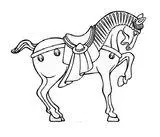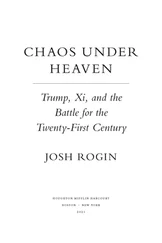Three men, two of them extremely tall, the third with only one hand, watched that fight from the northern edge of the summit of Stone Drum Mountain.
They were expressionless for the most part, except when one or the other would raise an arm and point to the Sardians racing along the lines, a glory amid carnage. When the three old men saw this, they would smile. Sometimes they’d laugh softly, in wonder.
“I would like one of those,” said the man with one hand.
“You don’t even ride any more,” said the tallest one.
“I’d look at it. I’d watch it run. It would bring me joy.”
“Why would he give you a Sardian horse?” said the other tall one.
The one with a single hand grinned at him. “He’s married my daughter, hasn’t he?”
“So I understand. A clever girl. Not dutiful enough, in my view. She’s better off having left us.”
“Perhaps. And he might give me a horse, don’t you think?”
“You could ask. It would be difficult for him to say no.”
The smaller man looked at one and then the other of his companions. He shook his head regretfully. “Too hard to say no. That’s why I can’t ask.” He looked down again at the battlefield. “This is over,” he said. “It was over before it began.”
“You think peace will follow now?”
“Up here perhaps. Not everywhere. We may not live to see peace in Kitai.”
“You cannot know that,” admonished the tallest one.
“I am pleased, at the least,” said the third, “that I lived long enough to have an answer about the wolf. It was honourable of him to send us word. Unexpected.”
“You thought he’d die himself when the wolf died?”
“I did. And now he is sending messages to us. It shows we can be wrong. The need for humility.”
The small one looked up at him and laughed. “It shows you can be wrong,” he said.
The others laughed as well. It is entirely possible, the teachings of the Kanlins suggest, to laugh while the heart is breaking for mankind.
They turned and walked away from the view of the battlefield.
THE REBEL GENERAL who’d accepted the offer of amnesty from Xinan might have expected treachery, might even have been resigned to it, but with the empire so desperately spent it was decided by the new advisers of the new emperor that the offered amnesty should be honoured. The general and his soldiers were allowed to live, and resume their posts defending Kitai.
Soldiers were urgently needed on the Long Wall and in the west and south, before all borders collapsed inwards under waves of barbarian incursions.
Weariness, sometimes more than anything else, can bring an end to war.
It was said to be the case that the emperor’s favourite wife, regarded by some later historians as dangerously subtle and too influential, played a role in encouraging him to keep that agreement—with a view to securing Kitai’s boundaries.
The first treaty negotiated and signed was with the Tagurans.
The second was with the Bogü. Their new kaghan, Hurok’s successor, was a man his people called the Wolf. It wasn’t clear why, then or later, but how would civilized people understand the names, let alone the rituals, of barbarians?
There were stories told that the same imperial princess, who was also Shinzu’s second wife, understood more than she ought to have about this matter of the Bogü, but the details of this—the documents so vital to a historian—were lost.
Some even said this had been deliberate, but in truth the disruptions of those years, the burnings of cities and market towns, movements of people and armies, emergence of bandits, warlords, disease, and death, were so very great, it was hardly necessary to imagine or assume a purpose on anyone’s part if records disappeared.
And it is always difficult, even with the best will in the world, to look back a long way and see anything resembling the truth.

Seasons tumble and pass, so do human lives and ruling dynasties. Men and women live and are remembered—or falsely remembered—for so many different reasons that the recording of these would take seasons of its own.
Every single tale carries within it many others, noted in passing, hinted at, entirely overlooked. Every life has moments when it branches, importantly (even if only for one person), and every one of those branches will have offered a different story.
Even mountains alter given enough time, why should not empires? How should poets and their words not become dust? Does not the true wonder emerge when something actually survives?
At Kuala Nor the seasons turned with sun and stars, and the moon lit green grass or made silver the snow and a frozen lake. For a number of years following the events recounted here (however incompletely, as with all such tellings) two men met there each spring, sharing a cabin by the lake, and labouring together to lay to rest the dead.
Birds cried in the mornings, wheeling above the water, the ghosts cried at night. Sometimes a voice fell silent. Both men knew why that was.
Then there came a spring when only one of the two arrived by the shores of the lake. This one worked alone that season, and the next spring, and then the next, but the following springtime no one came to Kuala Nor.
The ghosts remained. They cried at night under a cold moon or stars, winter, spring, summer, fall.
Time passed, in sweeping arcs of years.
And, finally, because not even the dead can grieve forever, forgotten, there came a moonlit night when there was no lost spirit crying at Kuala Nor, and there was no one by the lake to hear the last one’s final cry. It drifted into that night, within the ring of mountains, above the lake, rising there, and gone.
… peace to our children when they fall
in small war on the heels of small
war—until the end of time …
—ROBERT LOWELL
ACKNOWLEDGEMENTS

Ifind writing these acknowledgements both an opportunity and a challenge. This is true for every book, but perhaps even more so this time, since I’ve been living with Under Heaven for so many years.
There are individuals who have helped in many different ways, and a number of books and essays played roles in shaping this variation upon themes of the Tang. Too many names listed becomes cumbersome and (I fear) risks seeming over-elaborate or pretentious. Leaving people out feels worse.
I’m going to begin where many of these notes end: this is a work of fiction spun out of and through history. No one named here bears the remotest responsibility for what the author has done with the time, the place, and his story. Other people have sparked my thinking and my imagination, however, and my gratitude is considerable.
On brightweavings.com I have posted essays and speeches that offer (I hope) some clarity as to why I use the prism of the fantastic to treat the matter of history. Those interested will find some answers at that site.
My gateway to Tang China was by way of the master poets of the dynasty: Du Fu, Li Bai (the “Banished Immortal”), Wang Wei, Bai Juyi, and so many others. I read their works (and biographies) in English in many versions and the first acknowledgement I want to record here is to the poets and their translators. I am indebted to, among others: David Hawkes, Burton Watson, Arthur Waley, David Young, Red Pine, and Arthur Cooper. There are dozens of renderings of Tang poetry that I have read and profited from, but these names need to be cited.
Читать дальше
Конец ознакомительного отрывка
Купить книгу












